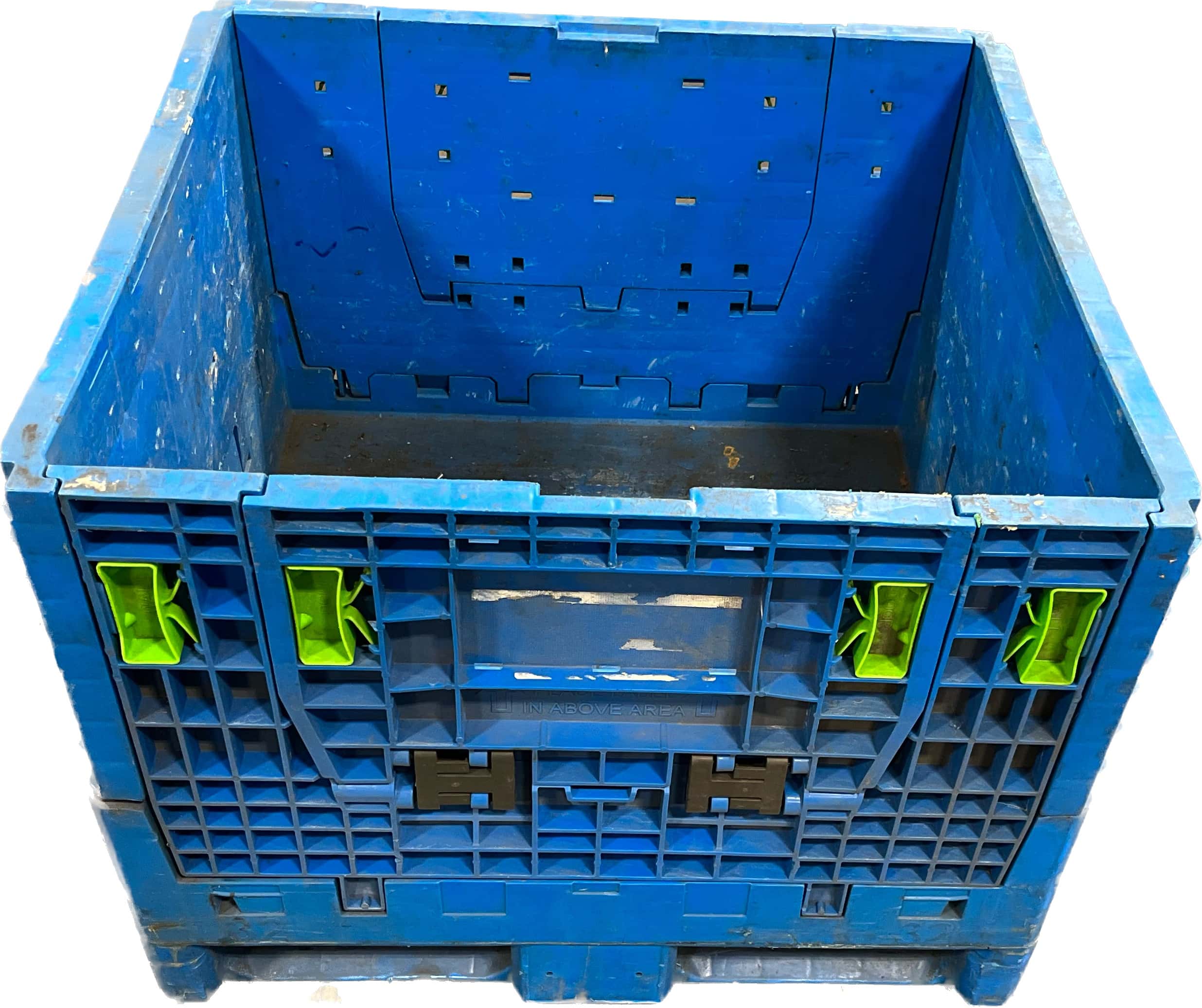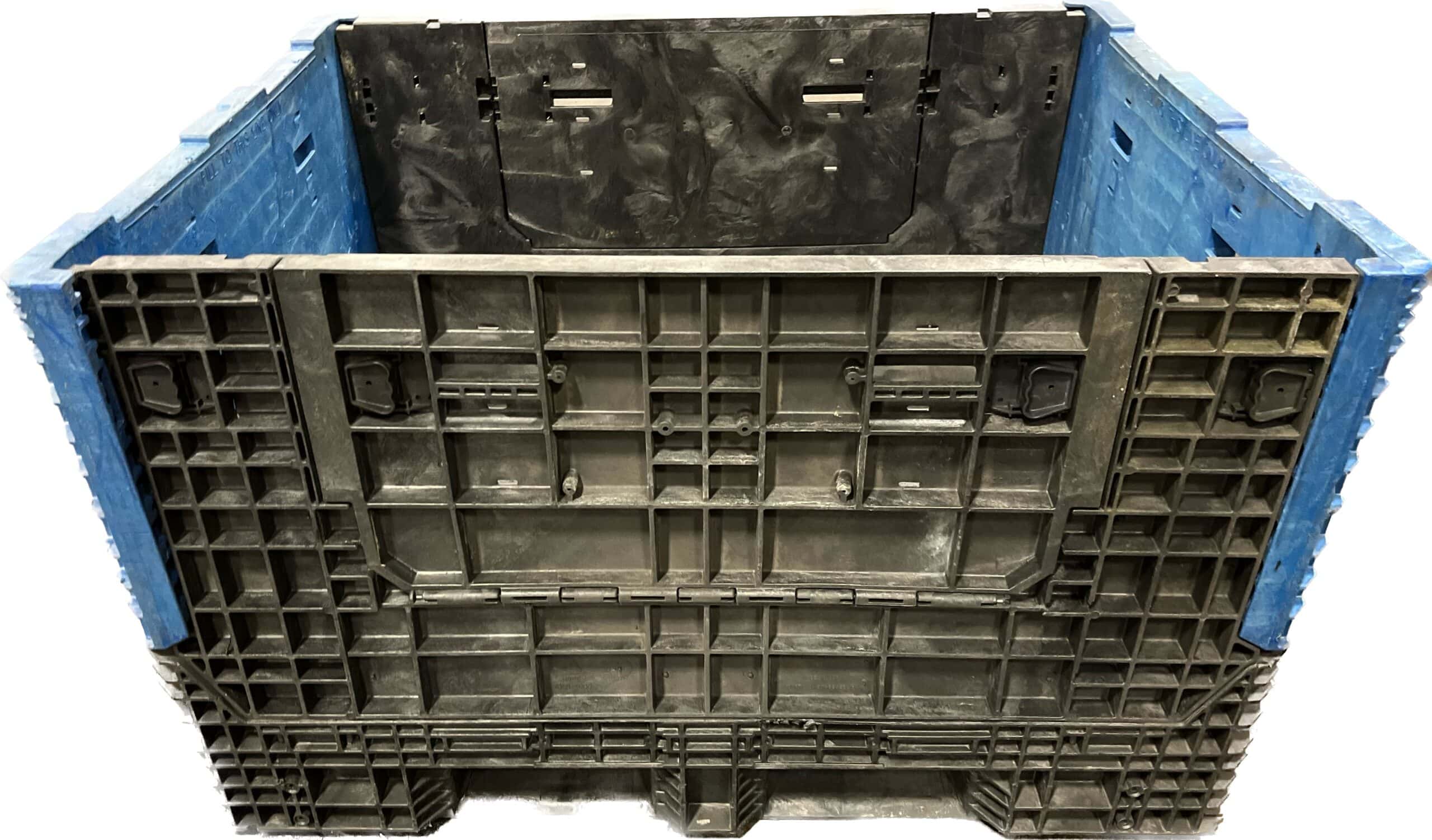Why used bulk containers are efficient for large-scale material management
Wiki Article
The Ultimate Overview to Picking the Right Bulk Containers for Your Organization Needs
Picking the suitable mass containers is important for any type of company that depends on effective logistics. Various kinds of containers exist, each designed for specific products and applications. Aspects such as size, product compatibility, and regulatory requirements play a significant function in this decision-making process. Comprehending these components can result in boosted functional efficiency. Several businesses forget important elements that might boost their overall effectiveness and sustainability. What are these factors to consider?Recognizing Different Kinds Of Bulk Containers
Bulk containers act as crucial devices for services looking for reliable storage space and transport solutions. These containers come in various types, each developed to satisfy certain operational needs. One common type is the intermediate mass container (IBC), which is optimal for granulated and liquid materials, using a balance of ability and ability to move. An additional popular alternative is the bulk bag, or FIBC, appropriate for dry, flowable items. These flexible containers are light-weight and can be quickly moved and saved. For heavier products, stiff bulk containers are usually utilized, supplying sturdiness and stability for secure handling. Furthermore, there are customized containers tailored for unsafe materials, guaranteeing conformity with safety guidelines. Understanding the distinctive attributes of these mass container kinds enables organizations to make educated choices that enhance logistics and lower prices. By selecting the appropriate container, business can improve their functional efficiency and streamline their supply chain processes.Trick Product Considerations for Bulk Containers
When choosing mass containers, it is vital to ponder the materials used in their building. Elements such as sturdiness, stamina, and chemical compatibility play an essential role in making certain the containers satisfy particular operational demands. Additionally, weight and mobility issues can affect both performance and transportation logistics.Material Sturdiness and Strength
Durability and stamina are crucial consider selecting materials for mass containers, as they straight affect the container's capability to endure different ecological problems and handling processes. Materials such as high-density polyethylene (HDPE), polypropylene, and stainless steel are frequently preferred for their robust residential properties, supplying resistance to effect, temperature level, and abrasion variations. The selection of product additionally affects the overall lifespan of the container; stronger products generally result in less frequent replacements, leading to cost financial savings over time. In addition, the weight of the product can influence delivery expenses and simplicity of handling. Companies should consider their particular operational settings and the possibility for deterioration to ensure peak toughness and stamina in their mass container selection.Chemical Compatibility Factors
Comprehending chemical compatibility is crucial for picking mass containers, as the materials made use of should resist the specific materials they will hold. Various variables affect compatibility, including the chemical nature of the materials, temperature, and duration of storage space. Destructive chemicals may require containers made from stainless steel or specialized plastics that resist destruction. Furthermore, reactive compounds can generate warm or gases, necessitating aired vent or pressure-rated containers. The choice of container product, whether polycarbonate, polyethylene, or metal, should straighten with the chemical buildings of the kept materials to avoid leakages or violations. Ultimately, a comprehensive analysis of these compatibility elements ensures safe handling and storage space, safeguarding both employees and the environment while preserving product honesty.Weight and Portability Worries
Picking bulk containers includes not just evaluating chemical compatibility however additionally considering weight and portability. Services have to evaluate the simplicity of handling and transportation to maximize efficiency. Lightweight materials like high-density polyethylene (HDPE) or light weight aluminum can assist in less complicated movement and reduce shipping costs. On the other hand, much heavier containers might give enhanced sturdiness however can prevent flexibility, particularly in environments needing regular relocation. Additionally, the design of the container ought to permit convenient lifting and stacking, guaranteeing ergonomic safety for workers. Business need to additionally consider the infrastructure available for transportation; as an example, containers suitable with forklifts or pallet jacks can streamline operations. Ultimately, the right equilibrium in between weight and transportability straight affects operational effectiveness and cost efficiency.Sizing Your Mass Containers for Optimum Performance
When sizing mass containers, companies should carefully analyze the measurements needed to suit their specific items. In addition, weight capability is a vital element that affects performance and safety and security throughout transportation and storage. Effective sizing not just optimizes room yet additionally enhances functional operations.Establishing Container Capacities
Choosing the appropriate dimensions for bulk containers is vital for maximizing performance in storage and transport. Services have to examine their specific demands, considering aspects such as offered area, the nature of the goods being saved, and the approaches of transport used. Accurate measurements ensure that containers fit ideally in storehouses and vehicles, decreasing squandered room and decreasing handling time. Standard sizes can use convenience, however personalized dimensions may be essential for distinct demands or to suit particular items. Additionally, it is essential to assess stacking capabilities and ease of access, as these aspects affect overall functional effectiveness. Inevitably, the appropriate dimensions result in enhanced company and structured logistics, profiting the overall efficiency of business.Weight Capacity Considerations
Understanding weight capacity is important for businesses aiming to maximize their bulk container effectiveness. The weight capability of a container straight influences storage capacities, transportation logistics, and overall operational costs. Selecting containers with the ideal weight limitations assures that organizations can safely store and deliver their items without risking damage or compliance problems. Overloading containers can cause architectural failings, while underutilizing capability results in wasted resources. It is vital for organizations to analyze their product weights and take into consideration any governing needs when picking containers. In addition, elements such as the kind of material, meant usage, and environmental problems must also influence weight capability decisions. By assessing these components, services can enhance performance and ensure a structured supply chain.Governing Conformity and Safety And Security Specifications

Regulatory conformity and safety criteria play a necessary function in the choice of mass containers for services. Organizations needs to assure that their containers satisfy numerous laws set by local, nationwide, and worldwide authorities. These requirements usually relate to material safety and security, structural honesty, and proper labeling, which help protect against crashes and ensure the risk-free transport of products.
Furthermore, adherence to industry-specific standards, such as those from the Fda (FDA) or the Occupational Security and Health And Wellness Management (OSHA), is critical for business dealing with hazardous products or food products. Non-compliance can result in penalties, lawful concerns, or damages to a service's track record.
Companies must also take into consideration the container's compatibility with the products being kept or transferred to avoid contamination or chain reaction (used bulk containers). To summarize, understanding and implementing governing compliance and safety and security requirements is vital for the accountable and reliable use of bulk containers
Sustainability Choices for Eco-Friendly Bulk Containers

Firms are additionally checking out options made from recycled materials, which not just save resources but additionally support the reusing sector. Innovations in design enable for lighter containers that call for less energy to transportation, additionally boosting sustainability. By integrating these environmentally friendly bulk container options, services can show their commitment to environmental stewardship while satisfying customer need for sustainable practices. This shift not only aids the planet however can likewise improve brand online reputation and consumer loyalty.
Cost-Effectiveness and Budgeting for Bulk Containers
While lots of businesses concentrate on sustainability, cost-effectiveness stays a vital factor when choosing bulk containers. Organizations needs to evaluate the first purchase cost, in addition to lasting operational expenses, to ensure monetary stability. Aspects such as upkeep, reusability, and toughness play a substantial duty in establishing general costs.Purchasing top notch containers might produce greater upfront expenses yet can result in savings via decreased substitute prices and lowered waste. Furthermore, services ought to think about transport expenses and storage efficiency, as these can impact the general spending plan.

Frequently Asked Inquiries
Just how Do I Identify the Right Container for Hazardous Materials?
To establish the best container for harmful materials, one have to evaluate compatibility with the substance, consider the container's product, check for governing conformity, and evaluate capacity and safety features to assure correct handling and storage.Can Bulk Containers Be Personalized for Details Products?
Yes, bulk containers can be personalized for certain items. refurbished bulk containers. Various functions, such as size, design, and product, can be customized to meet unique demands, ensuring optimal security and efficiency for transporting and saving different goodsWhat Is the Typical Life Expectancy of Various Bulk Container Types?
The ordinary life expectancy of mass container types varies; plastic containers last 5-10 years, metal containers 10-20 years, used plastic containers and wooden containers generally last 3-7 years, depending on usage, maintenance, and ecological problems.How Should I Clean and Maintain Mass Containers?
To clean and keep bulk containers, one ought to regularly evaluate for damages, eliminate deposit, laundry with suitable detergents, wash completely, and guarantee correct drying out before storage. Complying with maker guidelines improves long life and safety throughout usage.Are There Rental Choices for Mass Containers Available?
Yes, countless companies provide rental alternatives for bulk containers, supplying flexibility for businesses. These rentals can accommodate different requirements, allowing companies to take care of inventory effectively without the dedication of acquiring containers outright.Durability and stamina are crucial aspects in selecting materials for bulk containers, as they directly affect the container's capacity to stand up to different ecological conditions and dealing with procedures. Comprehending chemical compatibility is crucial for selecting bulk containers, as the products utilized should resist the certain substances they will certainly hold. Comprehending weight ability is important for businesses aiming to enhance their mass container efficiency. Regulative conformity and security requirements play an important duty in the option of mass containers for businesses. While many businesses concentrate on sustainability, cost-effectiveness continues to be a critical variable when picking mass containers.
Report this wiki page